World Breastfeeding Week 2013 Celebration Event Survey reveals over 85% of mothers breastfeed while conditions facilitating exclusive breastfeeding needed to be improved
2013-07-27
Hong Kong, 27 July 2013 – The Department of Health, Hospital Authority and UNICEF Baby Friendly Hospital Initiative Hong Kong Association (UNICEF BFHIHKA) organised a World Breastfeeding Week 2013 Celeation Event today. Results of the latest World Breastfeeding Week Annual Survey 2013 (the Survey) of UNICEF BFHIHKA released showed that over 85% of mothers initiated breastfeeding on discharged from hospitals, which is the highest ever in 20 years. However, the Survey also showed the conditions facilitating exclusive breastfeeding have to be improved and the social support to breastfeeding mothers needs to be strengthened.
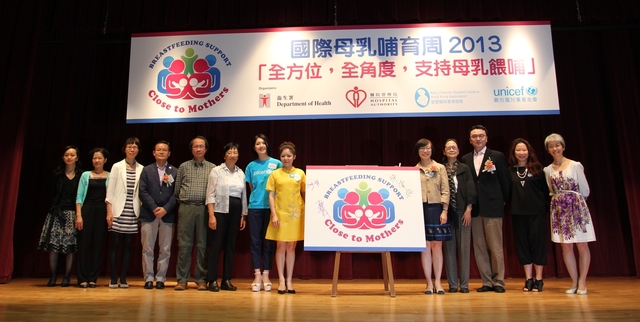
According to the Survey, out of the 91,472 births in 18 hospitals in Hong Kong with maternity units in 2012, the breastfeeding rate on discharge was 85.8%, 2.5% higher than that of 2011. Dr Leung Wing-cheong, Executive Committee Member of UNICEF BFHIHKA said, “As the HKSAR Government has prohibited Mainland mothers booking their deliveries in both public and private hospitals altogether in 2013, the birth rate is anticipated to decrease and thus reduce the burden on maternity units. We hope more manpower and time could be allocated for mother-friendly childbirth so as to further strengthen the support to breastfeeding mothers.”
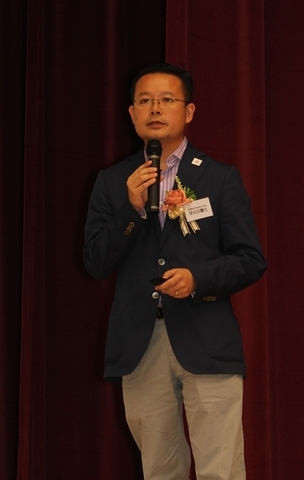 Regarding the compliance to the International Code of Marketing of Breastmilk Substitutes (“International Code”) developed by UNICEF and WHO, the Survey showed there is still room for improvement. Although all 18 hospitals with maternity units continue to stop receiving free supplies of infant formula, healthcare workers observed that violations of parts of the “International Code” have worsened.
Regarding the compliance to the International Code of Marketing of Breastmilk Substitutes (“International Code”) developed by UNICEF and WHO, the Survey showed there is still room for improvement. Although all 18 hospitals with maternity units continue to stop receiving free supplies of infant formula, healthcare workers observed that violations of parts of the “International Code” have worsened.
According to the Survey, 18% of hospitals noted ‘texts or pictures idealise artificial feeding’, three times that of the rate in the previous year; hospitals observing ‘staff from infant formula milk company approaching mothers’ and ‘offering them discount for infant formula’ were both 12%, instead of 6% in 2012.
Dr Leung Wing-cheong added, “With the drafting of the ‘HK Code’ completed and having undergone public consultation this year, we strongly hope that the ‘HK Code’ can be implemented very soon. This would be a crucial step to further protect and promote breastfeeding in Hong Kong from inappropriate marketing of breastmilk substitutes”. The Survey also revealed the support to mothers to facilitate exclusive breastfeeding in Hong Kong needed to be improved. The exclusive breastfeeding rates ranged from 14% to 56% in public hospitals for births in 2012 and even more varied in private hospitals, from 0 to 95%. However, the latest figure for public hospitals for births in March 2013 had increased to 32% to 61%.
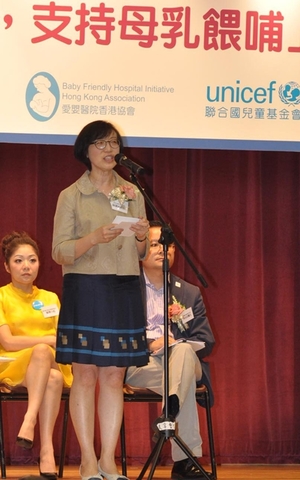 The “Ten steps to successful breastfeeding”, such as mother and baby rooming-in, training of medical and nursing staff, promoting mother support groups, etc., are important to ensure hospitals support breastfeeding. In the Survey, however, some hospitals reported that their staff are not acquainted with the breastfeeding policy, and less than a third of paediatric nursing staff and doctors, and obstetric doctors have completed training to support the implementation of the breastfeeding policy within six months of joining the service.
The “Ten steps to successful breastfeeding”, such as mother and baby rooming-in, training of medical and nursing staff, promoting mother support groups, etc., are important to ensure hospitals support breastfeeding. In the Survey, however, some hospitals reported that their staff are not acquainted with the breastfeeding policy, and less than a third of paediatric nursing staff and doctors, and obstetric doctors have completed training to support the implementation of the breastfeeding policy within six months of joining the service.
To echo the theme of World Breastfeeding Week this year, “Breastfeeding Support: Close to Mothers”, UNICEF BFHIHKA collaborated with the Department of Health to launch a new chapter on mother friendly childbirth to complement the existing Department of Health self-learning breastfeeding kit for healthcare professionals. Doctors, midwives and nurses will be able to complete their required training for a Baby Friendly Hospital after going through this new chapter on mother friendly childbirth and relevant chapters of the breastfeeding kit, other than the practical part.
In terms of peer support, which is vital to help mothers gain confidence in their ability to establish and sustain breastfeeding upon hospital discharge, UNICEF BFHHKA, Family Health Service and Department of Health launched a peer counsellor training programme in December 2011. To date, 27 ‘Baby Friendly Angels’ are providing counselling in breastfeeding support groups in three maternal and child health centres in Chai Wan, Lek Yuen and Tsuen Wan.
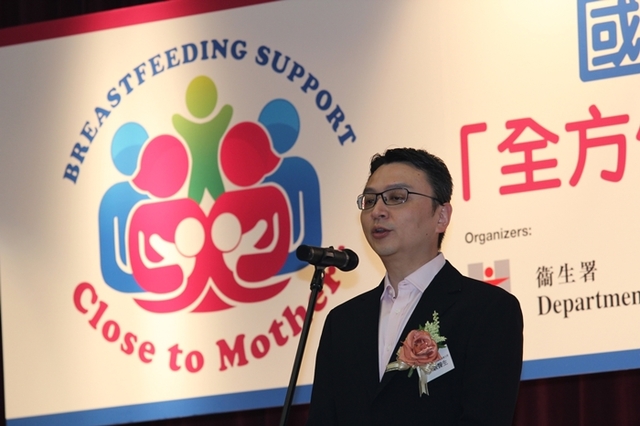 In the celeation event, Professor Sophia Chan, Under Secretary for Food and Health said, “Long before baby’s birth, many parents start rushing around to prepare presents, such as the safest baby crib, the most stylish baby romper, the most comfortable diaper. But do we know what the best present to help our beloved babies grow healthily is? It is breastmilk.”
In the celeation event, Professor Sophia Chan, Under Secretary for Food and Health said, “Long before baby’s birth, many parents start rushing around to prepare presents, such as the safest baby crib, the most stylish baby romper, the most comfortable diaper. But do we know what the best present to help our beloved babies grow healthily is? It is breastmilk.”
Dr Alexander Chiu, Chairman, Hospital Authority Steering Committee on Breastfeeding said, “To further promote breastfeeding in HA hospitals, starting from 2013, we shall increase our service capacity through recruiting more full time designated nurses to support and teach mothers of newborns about breastfeeding, and to help them overcome difficulties encountered both as in-patient and upon discharge. Furthermore, we shall also strive to achieve international recognition through attaining standards set up by WHO and UNICEF.”Ms Judy Chen, Chairman of Hong Kong Committee for UNICEF and Miss Miriam Yeung, UNICEF Regional Ambassador (East Asia and Pacific) shared their experience on breastfeeding with all the breastfeeding supporters in the event.
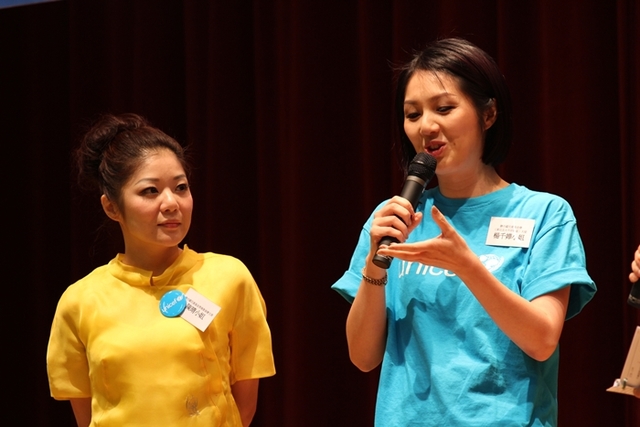
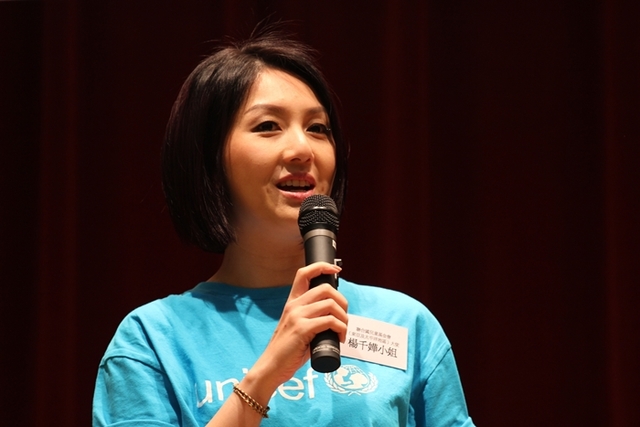
Ms Judy Chen said, “The United Nations Convention on the Rights of the Child states that every child has the right to survival and development, as well as the right to enjoy the highest standard of health. Breastfeeding is definitely the best present for our babies and all babies should have the right to be breastfed. Apart from the development of government policies, employers can also consider setting up breastfeeding and baby care rooms in workplaces, so that working mothers can have private areas to express and store breastmilk, allowing them to work with a peace of mind. I hope we can make breastfeeding the norm again, and have more mothers breastfeeding their children.”
Miss Miriam Yeung, a celeity mother of a 1-year-old boy and formerly a registered nurse shared about the importance of family’s day-to-day support on breastfeeding. “Breastfeeding is not only a mom’s issue.” She stressed, “I was lucky that my husband and post-natal care helper shared lots of my baby care work so that I could take enough rest and concentrate on breastfeeding. They also arranged nutritious meals for me, so that I had enough nutrition to happily produce breastmilk for my son.” Miriam insisted to breastfeed her son for six months and declined to advertise for infant formula milk.









